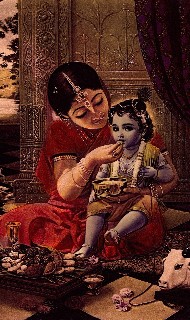QUESTION: Could you talk about the relationship of the bhakta’s sexuality and his/her sadhana. How to spiritualize sex?
Sex and Religion
Observance of regulation is the beginning of discipline, and discipline is the beginning of yoga. Thus sex begins to gain spiritual utility through religion – which regulates and refines sex through principles, rules and sacraments like marriage.
Sex in Karma-yoga, Tantra-yoga, & Sahajīya
Sex has spiritual utility in karma-yoga, because this yoga is all about performing one’s duties without selfish motive, and sex as part of one’s duty as a spouse and ones duty to produce children.
Tantra-yoga, a non-mainstream subset of karma-yoga, goes further and deals directly with sexuality as a tool for realizing one’s actual relationship to the external world.
Tantra blended with sahaj-buddhism came into the Vṛndāvana area a few centuries ago and became the sahajīya sect. They practice tantra-yoga with the nomenclature and context of Vrindavana bhakti – adopting “Rādhā / Krishna” in lieu of the standard “Prakṛti / Puruṣa” male / female concept. Although this may have validity as tantra-yoga, it is generally despised by those who practice sādhana as Sri Rupa defined it in Bhakti-Rasāmṛta-Sindhu.
Sex in Jñāna-yoga
Jñāna-yoga is characterized by cessation of activity, including sex. But Krishna does say in the Gītā (6.17) that even a jñāna-yogī doesn’t immediately abandon every basic bodily function, and should strive to be moderate and practical in their approach to things like eating, sleeping, and sex (“vihara”).
Sex in Bhakti-yoga
The same principle defined in Gītā 6.17 operates in bhakti-yoga as well, expressed by Śrī Rūpa in Bhakti-Rasāmṛta-Sindhu as the 8th aṅga of sādhana: “Being moderate in worldly affairs.” Different gurus define “moderation” in different ways, often differing even from one disciple to the next.
One or two sādhanāṅgas have aspects which give some allowance for elements of karma-yoga to become practices of bhakti yoga when done to please Krishna by performing the duties he has assigned through the śāstras (#51, “doing everything for his sake” and #47, “servitude”). These duties do not exclude the duties of a spouse and parent, which do not exclude sex. Ordinary bodily functions like eating, sleeping, reproduction, and self-defence, can thus become part of bhakti-yoga. Śrī Viśvanātha has said that even passing stool and urine can thus become a part of bhakti-yoga.
The real trademark of bhakti-yoga, however, is that it transforms sexuality by undertaking a quest for sexual passion to please Krishna, which Śrī Rūpa calls kāmarūpa bhakti. This is quest is followed by:
- Hearing carefully and in detail about how perfect souls such as the gopīs experience and express sexual passion towards pleasing Krishna,
- Always thinking of Krishna in the context of his relationship with the gopīs,
- Performing one’s daily practices like hearing and chanting with an internal relevance to that relationship, and
- Contemplating a perfected version of oneself which can take part in assisting their relationship.
To greater or lesser extent, and in more or less restricted or refined forms, all the yogas utilize sex as part of the process of purification, but only Gauḍīya bhakti envisions sexual passion as part of the divine objective. Thus, no yoga has as fully a transformative concept of sexuality as the bhakti-yoga of the Gauḍīyas.
Vraja Kishor das
vrajakishor.com
Tagged: sex, sex and yoga, Sexuality, spirituality and sex, tantra 







 By Madhavendu das
By Madhavendu das  By Damodara Dasa
By Damodara Dasa
 By Sadaputa Dasa
By Sadaputa Dasa










 By Kesava Krsna Dasa
By Kesava Krsna Dasa


 By Rohininandana Dasa
By Rohininandana Dasa


